Have you ever tried to search for something on Google that you didn’t know how to spell? Or struggled to get Google to understand what you were trying to say? With its newest algorithm update – the biggest update since RankBrain was introduced in 2014 – Google is hoping to make it easier than ever for users to search on Google using natural language (misspellings and all). According to Google, this technology, which was introduced and open-sourced last year, represents “one of the biggest leaps forward in the history of Search.” Its name is a bit of a mouthful – bidirectional encoder representations from transformers – so it’s been conveniently shortened to BERT.

What You Need to Know About BERT
In the phrase bidirectional encoder representations from transformers, transformers refers to models that process words in relation to all other words in a sentence, rather than one-by-one in order. Transformers allow the BERT system to better understand the full context of a word, taking into account the nuances involved. This is a neural network-based technique for natural language processing (NLP) pre-training. And using BERT, Google is more likely to understand the intent behind search queries, which will hopefully lead to more relevant results for users.
In addition to this software, Google is using new hardware to improve the function of the search engine. For the first time, it’s implementing the latest Cloud tensor processing units (TPUs) to present search results and provide relevant information as fast as possible.
With all of these changes, Google is aiming to do two things: improve the algorithm’s understanding of queries (especially never-before-seen queries, which account for 15 percent of all searches) and deliver more relevant results to searchers. As Google explained, “It’s our job to figure out what you’re searching for and surface helpful information from the web, no matter how you spell or combine the words in your query. While we’ve continued to improve our language understanding capabilities over the years, we sometimes still don’t quite get it right, particularly with complex or conversational queries.” With BERT, they’re hoping to change that – or at least take a step in the right direction.
How will BERT change the search experience?
Although BERT will impact both search rankings and featured snippets, it won’t be utilized in 100 percent of searches. For now, the update will be used in 1 of 10 searches in the United States made in English (it will roll out to other languages and locations in the future). BERT is also being used in all 24 countries where featured snippets are included in search results. The update is expected to change the search experience in the following ways:
- More Understanding: Google will better understand the context of words within a query, especially those in longer queries. The algorithm will also better comprehend queries with prepositions (like “for” and “to”) that impact the meaning of the query.
- More Relevant Results: Obviously, more relevant results is the goal of this update. If the algorithm understands users’ queries, even those that may be considered tricky or complex, and provide relevant results in return.
- More Natural Queries. In the past, searchers have sometimes resorted to using “keyword-ese,” creating queries composed only of words they think Google will understand. Now, with the addition of BERT, Google hopes users will begin writing queries in a more natural way, similar to how they would ask a question when speaking aloud.
Can I see some examples of BERT in action?
Google reported that they did a lot of testing to ensure that BERT will work effectively. The following examples (provided by Google) illustrate how BERT might impact various queries:
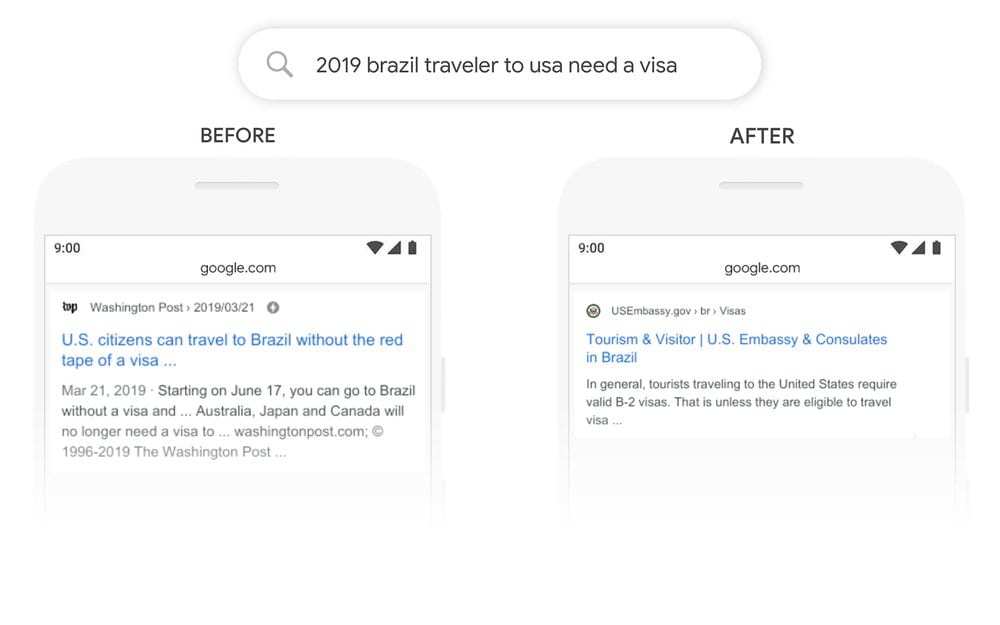
Old Google did not understand the importance of the word “to” and its relationship to the other words in the query. It returned a result about U.S. citizens traveling to Brazil, which is not helpful to the user.
Google with BERT understands the nuances at play and returns a more relevant result that should be helpful for a Brazilian person traveling to the U.S.
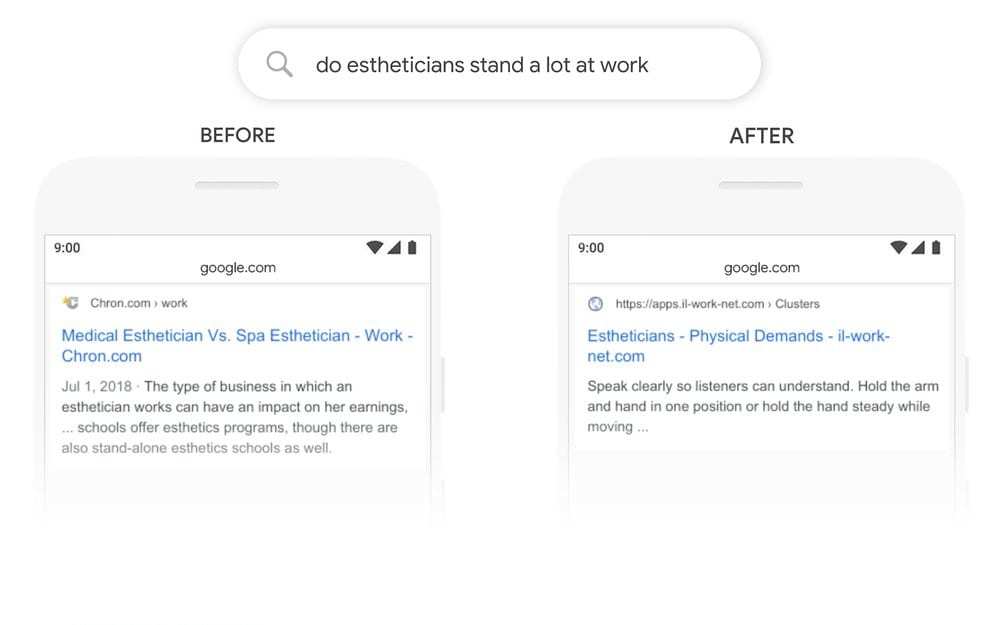
Old Google, failing to grasp the relationships between the words, matched the keyword “stand” to the word “stand-alone” in the resulting page’s content, despite the fact that the page doesn’t have anything to do with physically standing at work.
Google with BERT perceives that the user is asking about the physical demands of the occupation and provides a more useful result.
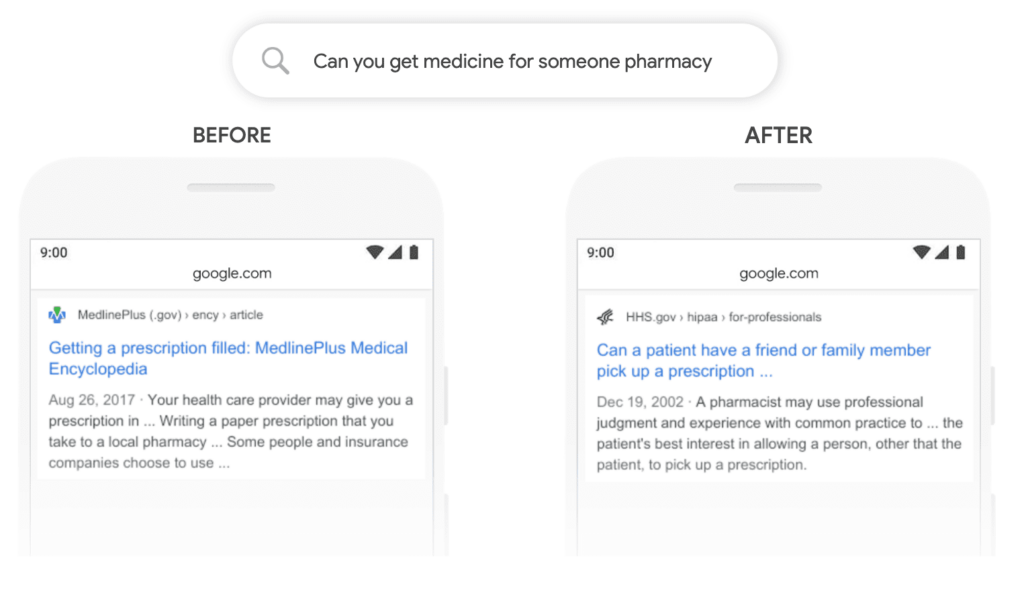
Old Google returned a very broad answer about getting a prescription filled, not understanding that the words “for someone” are critical to the user’s intent.
Google with BERT picked up on the fact that the user wants to know if a person can pick up a prescription for someone else and provided a relevant result that answers the question.
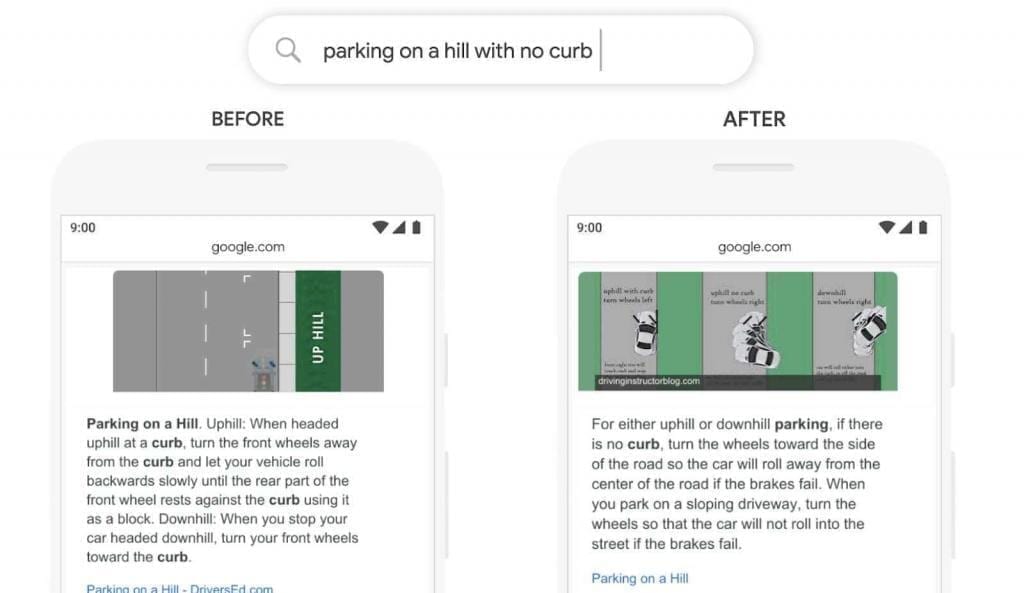
Old Google didn’t understand the importance of the word “no,” returning a broad featured snippet about parking on a hill.
Google with BERT grasped the importance of the word “no” as well as the relationship between “no” and “curb.” It offered a helpful result that fit the user’s intent.
Does this mean RankBrain has seen its last days?
If you’ve forgotten what RankBrain is, check out our blog post How RankBrain Works, which explores the history of RankBrain and the mechanisms behind it. Like BERT, RankBrain is a powerful tool for understanding user intent in queries, especially never-before-seen queries. BERT is not replacing RankBrain, however. Google will use both systems to better understanding content and queries; some queries will use one method or the other, and some will use both.
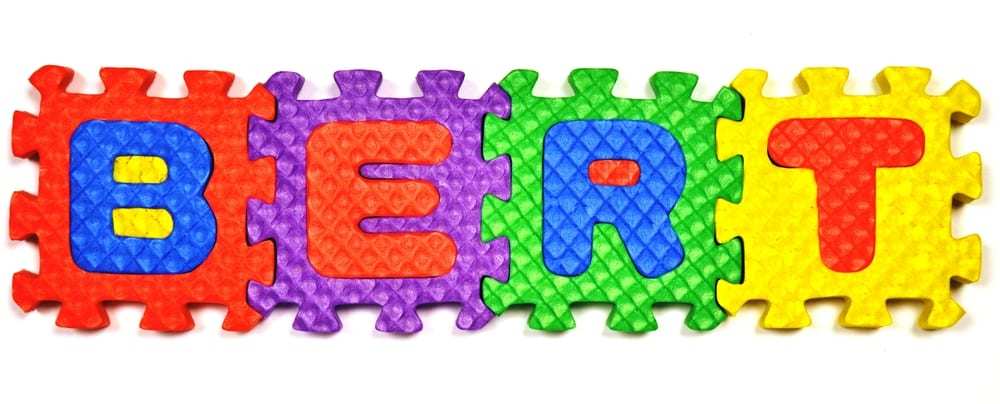
Optimizing for BERT
While Google didn’t state how BERT will affect search rankings, we know that Google considers this to be the biggest change to search in several years. That said, since BERT is only being used in 10 percent of English queries in the U.S., the impact on SEO should be minimal. If you’re curious how your site has fared, check your search traffic and learn which pages/queries were impacted (if any). Unless BERT affected conversion pages, you probably don’t need to be worried about it.
You might be wondering if you can optimize your website to take advantage of the BERT update. Unfortunately, this isn’t very likely. As with RankBrain, it’s difficult to optimize for a system that’s constantly improving and understands natural language. So as always, we encourage you to continue writing high-quality content for humans.
_____
Making sense of language – with all its nuances and complexities, from negations to synonyms – is an ongoing challenge for Google, and while BERT isn’t perfect, it seems to be a step in the right direction.
If you’re hoping to build a beautiful, effective website that ranks highly on Google, contact 417 Marketing for help. Our team of knowledgeable, creative, and passionate professionals specializes in SEO, web design and maintenance, and Google Ads, and we have successfully completed over 700 websites since our inception in 2010. Click here to contact us and learn more about what we can do for your company.


